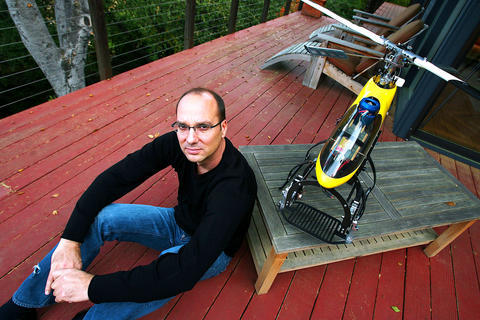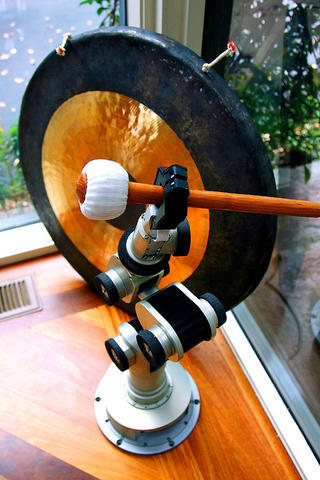A retinal scanner emitting a blue glow monitors the entrance to Andy Rubin's home in the foothills overlooking Silicon Valley. If the scanner recognizes you, the door unlocks automatically. (The system makes it easier to deal with former girlfriends, Rubin likes to joke. No messy scenes retrieving keys -- it's just a simple database update.)
Those forced to use the doorbell are greeted with another technological marvel: a robotic arm inside the glass foyer grips a mallet and then strikes a large gong. Although Rubin won't reveal its cost, it may be one of the world's most expensive doorbells.
"It's not about the cost," said Zarko Draganic, a former colleague of Rubin's at Apple Inc. "It's the classic Rubin thing: You do it for the sake of doing it and because it's cool, and as a result there's a childlike innocence about it."

PHOTO: NY TIMES NEWS SERVICE
Rubin is one of the primary architects behind another product that also smacks of potential uber-coolness -- the Google Phone. As Google's "director of mobile platforms," Rubin oversees dozens of engineers who are developing the software at the company's sprawling campus. The software embodies the promise of extending Google's reach at a time when cellphones allow consumers to increasingly untether themselves from their desktop computers, as well as the threat that greater digital mobility poses to Google's domination of Internet search.
The Google Phone -- which, according to several reports, will be made by Google partners and will be available by the middle of next year -- is likely to provide a stark contrast to the approaches of both Apple and Microsoft to the growing market for smartphones. Google, according to several people with direct knowledge of its efforts, will give away its software to handset makers and then use the Google Phone's openness as an invitation for software developers and content distributors to design applications for it.
If the effort succeeds, it will be the most drastic challenge to date of the assertion by Microsoft -- the godfather of the desktop PC -- that Google and other members of the so-called open-source world can imitate but not innovate.

PHOTO: NY TIMES NEWS SERVICE
And as the cell phone morphs further into a mobile personal computer, a new software standard is likely taking shape. Whoever takes the lead in this market may become a technological gatekeeper wielding the same power, and reaping the same profits, that Microsoft does through its Windows operating system.
As the industry shifts, Google doesn't want to fall behind, and the Google Phone reflects its bid to remain at the center of things. It plans to do that, industry executives said, by offering free mobile software and then presumably cashing in by providing a menu of services linked to those products, like e-mail, photos, news and other services.
"Instead of making money on software, you have someone who is saying they're trying to make their money on services," said Michael Kleeman, a technology strategist at the California Institute for Telecommunications and Information Technology at the University of California at San Diego. "The interesting question is whether the carriers will authorize the Google handsets on their networks."
All of these developments and uncertainties underscore why visitors to Rubin's office here get an immediate sense of his project's importance for Google. Large signs in the corridors leading to his laboratory warn that only employees are allowed to pass.
The company refuses to comment on the Google Phone, but Rubin's responsibilities, as well as recent leaks from the unannounced alliance that Google is building to develop the software, indicate that the company plans to do more than merely develop an operating system for cellular phones: it plans to muscle its way into the center of the business at a time when people worldwide are searching the Web from nearly anywhere they happen to be.
Consumers are using smartphones to find directions, meet their friends and locate nearby stores, restaurants and movie theaters. That simple business and cultural shift has touched off an information-age gold rush, as Google, its search competitors, handset makers and cell phone operators all try to stake their claims to the mobile Web.
Already this year, Apple has redefined what people expect from a cell phone by introducing the iPhone, just as it did previously with its Macintosh computer. Microsoft is making progress as well, projecting that 20 million phones will be sold with its Windows Mobile software next year. Nokia, Palm, Research in Motion and a number of other handset makers are fashioning ever more datacentric phones.
With these battle lines drawn, Google is placing its mobile bets in the hands of Rubin, 44, an engineer who has proved adept at designing the highly integrated hardware and software ensembles that are the hallmarks of Silicon Valley companies.
And even though he is in charge of developing Google's answer to the Internet phone of the future, Rubin is a throwback. While Silicon Valley is now in the midst of a "Web 2.0" entrepreneurial frenzy, with an emphasis on clever business ideas that quickly attract millions of Internet users, Rubin is a proven member of an earlier group of engineers-turned-entrepreneurs who have a passion for building complete digital systems.
"Today Silicon Valley is full of `network-effect entrepreneurs,' but Andy represents a generation that is equally comfortable with a soldering gun, writing software programs or designing a business," said Steve Perlman, another former Apple engineer who was a co-founder of WebTV and a handful of other technology-oriented companies.
In that regard, Rubin may be one of the clearest links between the computing industry's recent past and its rapidly emerging future -- and the embodiment of how Google hopes to bridge the two realms.
Rubin is wrestling with a new responsibility: trying to reinvent the cell phone on his second try. He declined to offer any insights into his strategy, and whether he has the answer won't be clear for about a year -- perhaps longer. Google has a tremendous amount of corporate momentum, and its search service is a huge consumer magnet. At the same time, wireless carriers jealously guard their networks and worry constantly about the possibility of losing control to potential competitors like Google.
Moreover, the market is already crowded. Microsoft got a head-start with its Windows Mobile platform a half-decade ago and in the past year has accelerated its efforts by persuading handset makers like Motorola, Palm and Samsung to include the software with its phones. Microsoft is certain to invest heavily to ward off Google's incursions into the market.
An irony in all of this, of course, is that Google, though not in a dominant position, might be able to replay the strategy that Microsoft itself used to bulldoze Netscape in the mid-1990s. Just as Microsoft successfully "cut off" Netscape's air supply by giving away its Explorer Web browser as part of the Windows operating system, Google may shove Windows Mobile aside if the Google Phone is given away to handset makers.
And if the strategy works, it will be because a robotics fanatic named Andy Rubin and his team will have successfully developed the smartphone of the future.

A Ministry of Foreign Affairs official yesterday said that a delegation that visited China for an APEC meeting did not receive any kind of treatment that downgraded Taiwan’s sovereignty. Department of International Organizations Director-General Jonathan Sun (孫儉元) said that he and a group of ministry officials visited Shenzhen, China, to attend the APEC Informal Senior Officials’ Meeting last month. The trip went “smoothly and safely” for all Taiwanese delegates, as the Chinese side arranged the trip in accordance with long-standing practices, Sun said at the ministry’s weekly briefing. The Taiwanese group did not encounter any political suppression, he said. Sun made the remarks when

PREPAREDNESS: Given the difficulty of importing ammunition during wartime, the Ministry of National Defense said it would prioritize ‘coproduction’ partnerships A newly formed unit of the Marine Corps tasked with land-based security operations has recently replaced its aging, domestically produced rifles with more advanced, US-made M4A1 rifles, a source said yesterday. The unnamed source familiar with the matter said the First Security Battalion of the Marine Corps’ Air Defense and Base Guard Group has replaced its older T65K2 rifles, which have been in service since the late 1980s, with the newly received M4A1s. The source did not say exactly when the upgrade took place or how many M4A1s were issued to the battalion. The confirmation came after Chinese-language media reported

The Taiwanese passport ranked 33rd in a global listing of passports by convenience this month, rising three places from last month’s ranking, but matching its position in January last year. The Henley Passport Index, an international ranking of passports by the number of designations its holder can travel to without a visa, showed that the Taiwan passport enables holders to travel to 139 countries and territories without a visa. Singapore’s passport was ranked the most powerful with visa-free access to 192 destinations out of 227, according to the index published on Tuesday by UK-based migration investment consultancy firm Henley and Partners. Japan’s and

BROAD AGREEMENT: The two are nearing a trade deal to reduce Taiwan’s tariff to 15% and a commitment for TSMC to build five more fabs, a ‘New York Times’ report said Taiwan and the US have reached a broad consensus on a trade deal, the Executive Yuan’s Office of Trade Negotiations said yesterday, after a report said that Washington is set to reduce Taiwan’s tariff rate to 15 percent. The New York Times on Monday reported that the two nations are nearing a trade deal to reduce Taiwan’s tariff rate to 15 percent and commit Taiwan Semiconductor Manufacturing Co (TSMC, 台積電) to building at least five more facilities in the US. “The agreement, which has been under negotiation for months, is being legally scrubbed and could be announced this month,” the paper said,